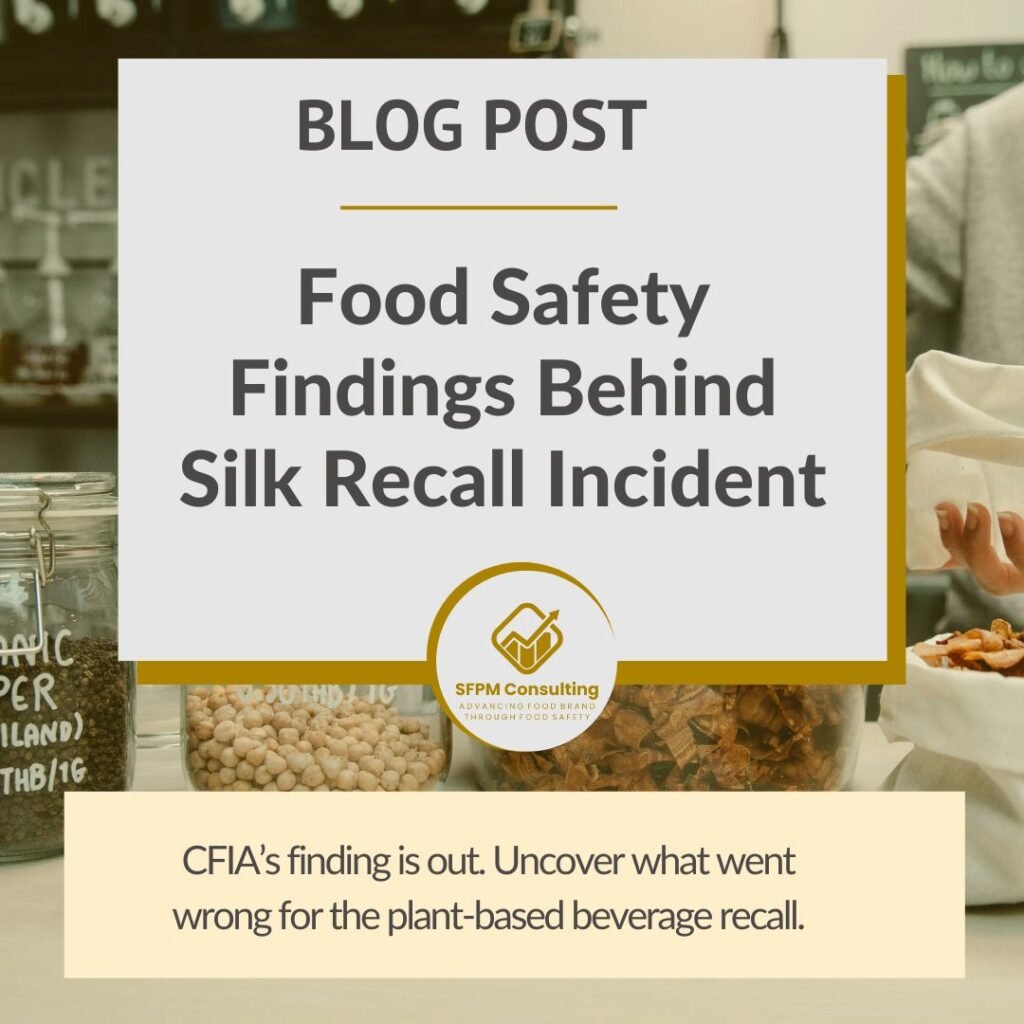The result is out! I promised to share more about silk plant-based beverages when we hear more.
Here is where you can find the CFIA’s official statement:
https://www.canada.ca/en/food-inspection-agency/news/2024/10/statement-on-the-conclusion-of-the-food-safety-investigation-related-to-the-recall-of-various-silk-and-great-value-brand-plant-based-refrigerated-b.html
If you dislike reading, here are some quick summaries for you:
According to the CFIA, there were few findings.
- Listeria was present in the environment upon swabs and testing, but the primary source was not confirmed.
- It is likely to occur post-pasteurization.
- The recommended testing for finished products and environmental sampling was not completed per the protocol suggested by Health Canada. You can find Health Canada’s Policy on Listeria Monocytogenes in Food Products here.
Please also remember that this policy was recently updated in 2023. If you are a food manufacturer, please conduct a reassessment to see if this policy change applies to you.
The Plant-Based Beverage Recall Learning
Many will agree that the presence of listeria monocytogenes in a product that has been pasteurized is very rare as the product typically is not associated with listeria monocytogenes due to pasteurization.
It is important to be aware that cross-contamination remains a potential cause for contamination in similar establishments (i.e., dairy facilities).
Evaluating your environmental monitoring program and procedures is important to ensure that our manufacturing establishment is not a source or does not become a source that can support pathogens such as listeria monocytogenes and Salmonella spp.’s growth.
Seek and Destroy in Environmental Monitoring
Remember: the seek-and-destroy concept in pathogen swabbing for environmental monitoring programs. We perform swabbing to find potential pathogens before they enter our food supply so we can destroy them. If you are not seeing any, have you looked deep enough?
Or are you just not doing enough?
Do you want to know more about the environmental monitoring program, consider this guidance from SQFI on Environmental Monitoring at https://sfpmfoodconsulting.com/sqf-9-guidance-documents/
Seek Help if You Need Clarification
If you have a challenge or doubts about your environmental monitoring program, consider working with us so our team can guide you or clarify the concept.
Source of Cross-Contamination
When I do any Good Manufacturing Practices training for our client, I first stress that we, as humans, who can walk around and move things through the facility, are the main vectors for cross-contamination.
This is true for all food facilities. Make sure you have proper GMP training and practices in place. If you have consistent challenges with GMP, increase your monitoring frequency and educational effort and work with the team and HR for proper GMP rule enforcement.
We have seen in many of our clients that our GMP training (coming from a third party) helps them to get better compliance with GMP.
Conduct an annual GMP because we all need a reminder of the food safety rules. Make sure your team leader practices what we preach. No one should receive an exception to the GMP rules. Don’t break the rule!
What Can You Do If You Cannot Afford A GMP Training?
We run one free public GMP training annually to help support small manufacturers. If this is you, please fill out this form so we don’t miss sending you an update when this complimentary GMP training is scheduled. Here is the link: https://forms.gle/jfygySShjbqRNXMN9.
Estimating a Q2 training, but if I see this fill up faster, we can expedite this.
Our GMP training is often one of our best training programs, and it comes with a certificate of attendance for live attendees.
Next Step for Your Processing Facility
By looping everything we talk about about cross-contamination, ensuring GMP, providing training to prevent cross-contamination (and direct contamination), and following the new Health Canada’s protocol on Listeria monocytogenes sampling, we need to understand why. Why do we need to follow these protocols?
Food safety is about ensuring we have the right process and management processes to prevent pathogens that may cause foodborne illness (recall, death and brand reputation damage) from entering our supply chain.
Are you doing enough to keep pathogen away from our food and poisoning others? Don’t make our customers sick (or lay in bed).
It is important to me to make sure we are re-evaluating our ready-to-eat facilities to ensure that even if our food does not support listeria monocytogenes’ growth, our environment must be considered.
Recall notification subscription link
I encourage everyone to sign up for the Health Canada and CFIA recall updates email so you know about the recall first-hand.
https://recalls-rappels.canada.ca/en/subscribe
References:
https://www.canada.ca/en/food-inspection-agency/news/2024/10/statement-on-the-conclusion-of-the-food-safety-investigation-related-to-the-recall-of-various-silk-and-great-value-brand-plant-based-refrigerated-b.html
https://www.canada.ca/en/health-canada/services/food-nutrition/legislation-guidelines/policies/listeria-monocytogenes-ready-eat-foods.html

